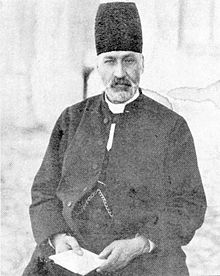Mirza Nasrollah Khan
Nasrollah Khan Moshir al Dowleh (*?; † 1907 ) was the first Prime Minister of Iran under Mozaffar ad-Din Shah after the Constitutional Revolution of 1906.
Life
Nasrollah Khan began his professional career as a scribe. He had a small office near the government building and wrote letters and petitions for the illiterate. He came into contact with the powerful and wealthy of his time through the letters and submissions that were usually given personally by him. He married the daughter of a wealthy businessman. The marriage resulted in two sons, Hossein and Hassan. His sons Hossein Pirnia and Hassan Pirnia would later take an active part in the Constitutional Revolution in Iran and play an important role in Iranian politics as MPs and Prime Minister.
Nasrollah Khan became the private secretary of the Foreign Minister at the court of Naser al-Din Shah and became a wealthy man over time.
On July 29, 1906, he took over the office of Prime Minister and worked with a committee set up by Mozaffar ad-Din Shah, to which his son Hassan also belonged, the first electoral law and the Basic Law of Iran. The Basic Law was then solemnly put into effect on August 6, 1906. Prime Minister Nasrollah Khan Moshir al Dowleh declared that Iran was still an absolutist, Islamic monarchy ( maschrueh ), the Shah could decide alone and the parliament could only draft laws but not enforce them. However, Parliament rejected the Prime Minister's declaration and began drafting and passing laws independently. Thousands of Tehrans gathered in front of parliament to demonstrate for a constitutional monarchy ( maschruteh ) and a nation-state.
After the death of Mozaffar al-Din Shah, Mohammed Ali Shah took over the reign. He set up a commission of experts to work out an amendment to the constitution in order to finally clarify the form of government in Iran. Nasrollah Khan had since resigned as Prime Minister in favor of Ali Asghar Khan Atabak . On May 4, 1907, the new Prime Minister Ali Asghar Khan Atabak presented his cabinet to Parliament.
The dispute between the different conceptions of the forms of government escalated further. The cleric Sheikh Fazlollah Nuri demanded a clear commitment to the maschrueh , the Islamic monarchy. He drafted a legislative proposal according to which a panel of experts made up of five clergymen would have to review all parliamentary bills to see whether they corresponded to Islamic legal principles. Should they violate them, the panel of experts could declare them invalid. Nuri also demanded that this rule should be written into the constitution as unalterable, that it should apply until the appearance of the hidden Imam and that it could not be repealed or modified by a parliamentary majority. On June 15, 1907, Nuri's proposal was passed in parliament after the latter had given three days' assurance that he would stop his verbal attacks on parliament.
On August 31, 1907, Prime Minister Ali Asghar Khan Atabak was assassinated and Nasrollah Khan Moshir al Dowleh took over the office of Prime Minister again. On October 7, 1907, Nuri's proposal was adopted as a supplement to the previous constitution.
After his death in late September 1907, he bequeathed his title Moshir al Dowleh to his eldest son Hassan.
literature
- Cyrus Ghani: Iran and the rise of Reza Shah. From Qajar collapse to Pahlavi rule . IB Tauris, London et al. 1998, ISBN 1-86064-258-6 , p. 78.
| personal data | |
|---|---|
| SURNAME | Khan, Mirza Nasrollah |
| ALTERNATIVE NAMES | Khan, Nasrollah Moshir al Dowleh |
| BRIEF DESCRIPTION | Iranian politician and Prime Minister of Iran |
| DATE OF BIRTH | 19th century |
| DATE OF DEATH | 1907 |
